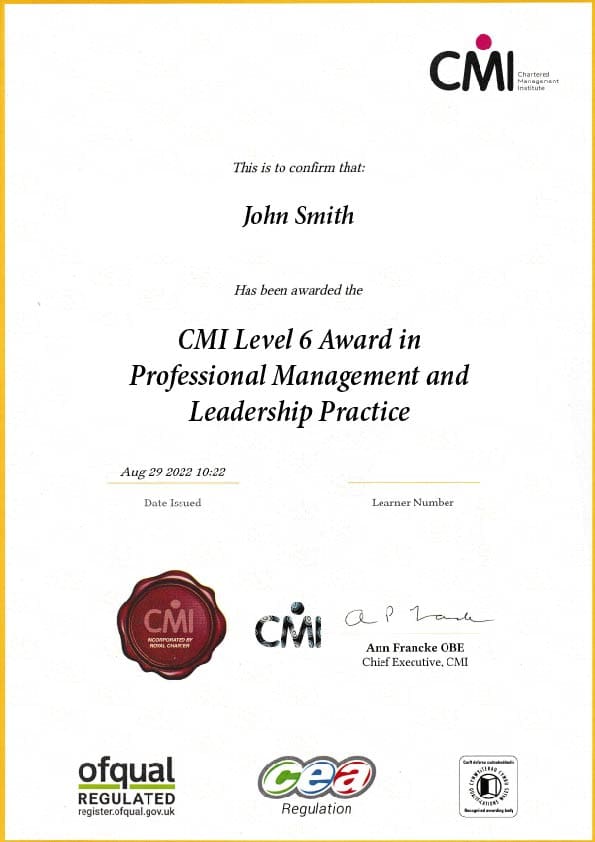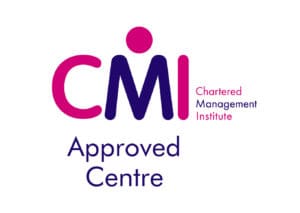CMI Level 6 Award
The CMI Level 6 Award in Professional Management and Leadership Practice is ideal for you if you aim to develop professional management and leadership practice and drive business activities in a Senior, Regional Specialist, or Director-level management and leadership role.
After completing this qualification, you will be able to drive business activities as a senior leader or manager and you will have the capacity to tailor your management skills in order to focus on particular areas suited to your working environment.
You can benefit from joining the majority of our students by following this Level 6 qualification with the CMI Level 7 Diploma in Strategic Management and Leadership Practice to validate your experience, knowledge, and skills after climbing the career ladder.
Certification details
Fully-Accredited
ITonlinelearning (provider number C10436701) is a CMI Approved Centre (AP), which means that this certification has been rigorously assessed and approved to meet industry standards.
Your Certificate
Hard work pays off: you’ll receive a CMI Level 6 Award in Professional Management and Leadership Practice (qualification number: 603/4114/2) once you have completed your final unit in this qualification.
Certification: CMI Level 6 Award in Professional Management and Leadership
Vendor: Chartered Management Institute (CMI)
Course prerequisite: There are no formal prerequisites to study this qualification
Study time: 50 hours
Certification requirements: You will need to select and complete at least one unit to a minimum of 50 TQT hours, 5 credits to achieve this qualification, selected from units 601-614, Group A. The minimum guided learning hours is 15.

What’s included?
You are eligible for, subject to your package choice and support requirements:
- Consultation with a Career Consultant to corroborate your course choice
- Full selection of CMI Level 6 study units as offered by the CMI
- Depending on your experience level, you could be eligible for Foundation or full-fledged Chartered Manager Status
- Draft checking & official marking for assignments, as well as 1 free re-take
- Access to a full Support Team including a Tutor and Study Coach
- CMI Membership with exclusive benefits
- A professional, Management-oriented CV rewrite*
- A LinkedIn profile overhaul to maximise your new networking opportunities*

*Value-added service that can be added at an additional cost
Claim Your Post-Nominals
Want to command the highest esteem as a qualified Management Professional? Do you want to add the renowned “CMgr” post-nominals after your name to showcase your prestige?
You are eligible for full-fledged Chartered Manager Status if you complete a CMI Diploma or Extended Diploma (at Level 5 or higher) and have more than 3 years’ experience in a management role.
On your way to becoming a Chartered Manager? Why not take the first step with Foundation Chartered Manager Status, so that you can add the post-nominals “fCMgr” after your name?

Who are the CMI?
Since 1947, the Chartered Management Institute has empowered management and leadership professionals. The CMI upholds the highest standards of the profession and offers Chartered Manager Status through their Royal Charter, bringing together a global community of passionate & dedicated managers.
Established in the aftermath of the Second World War, their mission was to help rebuild the UK by raising the quality and standard of management. CMI developed the first diploma in management, and they are still dedicated to improving management practice today.

Choosing Us for Your CMI Training Means
You get access to the widest selection of Study Units available directly from the CMI to tailor a study programme that best suits you and your career.
Over and above your official assignment submission to the CMI that results in a pass or refer outcome, our in-house CMI Tutor and Study Coach checks your assignment draft. We review your assignment to give you feedback on the subject matter, provide you with advice, and ensure you are aware of any areas that need improvement – all to maximise your chances of getting a pass on the first try! Plus, you’re eligible for one free retake for each assignment.
You will have access to a CMI Study Coach and Mentor to keep you on track with your studies, provide you with study support, and help ensure you complete your studies successfully. Learners just like you regularly highlight the value of having a Study Coach and Mentor (in their learner surveys) in terms of helping them successfully achieve their qualifications in the most effective way.
Your personal, specialist Recruitment Advisor will provide you with a professional CV review, LinkedIn profile overhaul, interview support, and career coaching so that you can fully utilise the new networking opportunities you have access to!
You will gain exclusive access to the CMI so that you can benefit from continued professional development (CPD), career tools, webinars, articles, events, and networking with other CMI professionals!
With ITonlinelearning, you get 3 months’ unlimited access to your course – so you can access CMI’s Management Diagnostics Tool, Knowledge & Insights Hub, Events & Webinars, CPD Record, Mentoring, Management Direct, Career Development Centre, and Qwell Mental Health Support.
We are an Accredited Training Organisation (ATO) for the UK’s most esteemed learning providers
Why Choose CMI?
UK-Endorsed Accreditation
Hard work pays off: you’ll receive a certificate accredited by the prestigious, globally recognised Chartered Management Institute once you have completed this qualification: a highly regarded testament to your skills.
Improved Career Prospects
A whopping 80% of Managers said that gaining a CMI qualification is a key element of becoming a professional manager!
You Get Post-Nominals
Want to command the highest esteem as a qualified Management Professional? Do you want to add the renowned “CMgr” post-nominals after your name to showcase your prestige? With CMI, you can!
Helping You Help Your Team
About 79% of CMI qualification holders confirmed that their new skills have increased overall team performance – which is great if you’re looking to increase your salary on an individual- and team-basis.
Get a Bachelor’s Degree Equivalent.
When you complete a CMI Level 6 qualification, you earn the academic equivalent of a Bachelor’s Degree in Professional Management and Leadership Practice.
Assignment-Based Qualifications
Did you know that assignment-based assessment yields better results than examinations, likely because of the lack of feedback in exam-based qualifications? Well, CMI qualifications are assessed purely through assignment completion.

Source: Adzuna
Handpick Your Curriculum
ITonlinelearning offers all the Level 6 study units from the CMI – so you have the widest selection available to tailor a study programme that best suits you and your career!
To achieve the CMI Level 6 Award in Management and Leadership Practice, you will need to complete 1 module below to a minimum of 50 TUT (Total Unit Time) hours and 5 credits.
An outstanding professional manager and leader is someone who has the ability to select and apply knowledge, skills, values and behaviours effectively in their working role. Whilst many of these attributes can be developed through experiential learning, these can be sharpened and amplified through an in-depth exploration of the topic.
The aim of this unit is to enable the professional manager and leader to consider the influence of an organisation’s context on how individuals are managed and led. They will reflect on the values, behaviours, knowledge and skills required, not only to deliver successful organisational outcomes, but to lead individuals with confidence.
Individuals and teams are a highly prized resource which, if developed, managed and led effectively, can transform an organisation’s reputation, productivity and success.
The aim of this unit is for the professional manager and leader to understand the principles for developing, managing and leading individuals and teams. On completion of the unit, learners will understand the multi-dimensional factors which influence the way individuals and teams are developed and led. They will examine the role of organisational structures for managing human resources and be given the opportunity to research classic and contemporary approaches to the management and development of individuals and teams. Ultimately, this unit will culminate in an assessment of the skills required to lead and develop individuals and teams in a manner that not only achieves results but is ethical, fair, empowering and collaborative.
Culture matters. Beliefs, principles, ideologies, behaviours and values have the power to influence an organisation’s success. Culture is emergent, it develops over time and is influenced by the cultural identity of staff and stakeholders and the approaches taken to lead and manage others. It is also influenced by an organisation’s history, purpose, activities, vision, mission and values.
The aim of this unit is to equip professional managers and leaders with an understanding of the role and impact of culture within organisations and the approaches to make and sustain cultural change.
Programme and project management is an essential skill for a professional manager and leader to develop. Whilst a project is singular, programmes will encompass a range of projects. The reality of managing programmes and projects is complicated. There are a broad range of multi-dimensional issues which influence how these are led; not least the impact of stakeholder involvement, financing, resourcing and appetite for risk. Ultimately, the success of a programme or project is judged on the achievement of goals within the parameters of cost, quality, resources used and timescales.
The aim of this unit is to equip professional managers and leaders with an understanding of how to proactively respond to the demands of project and programme management, regardless of their type, size and complexity.
The ability to drive innovation and change is an essential skill for a professional manager and leader. Innovation, defined simply as ‘doing something new or different,’ is a powerful catalyst for change. It can revolutionise an organisation’s operational activities, create dynamic new opportunities, and contribute to the achievement of strategic goals. Change occurs in many forms and leaders must be able to respond to changes which are radical, incremental or evolutionary.
This unit has been designed to enable the professional manager and leader to understand innovation and change within organisational contexts. It explores the rationale for innovation and change, such as the impact of technology and digitalisation. Most importantly it focuses on the knowledge, values and behaviours that ultimately will equip the professional managers and leaders to successfully drive innovation and change.
Organisational strategy is often seen as a blueprint which guides an organisation’s path. It can be created to provide stakeholders with the organisation’s direction for the future, as well as enabling an organisation to measure and monitor its success. Organisational strategy may evolve over time to respond to different circumstances, new opportunities or unexpected challenges. Ultimately, successful outcomes result from the way the organisational strategy is led, managed and implemented.
The aim of this unit is to enable professional managers and leaders to understand approaches to developing organisational strategy and how to formulate and lead operational strategy to achieve a strategic aim.
The ability to procure, purchase and contract goods, services and capital items effectively is of paramount importance if an organisation is to succeed. For the professional manager and leader this knowledge and understanding is invaluable. It has the power to enhance decision making, strategic and operational planning, and the effective delivery of outcomes within budgetary constraints. It is important to recognise that the terms ‘procurement’ and ‘purchasing’ are interpreted differently depending on the type of organisation. For the purpose of this unit, ‘procurement’ is recognised as the strategic activity that will be underpinned by ‘purchasing’ and ‘contracting’.
The aim of this unit is for managers and leaders to realise business objectives though competent, ethical and professional contracting, purchasing and procurement practices.
Corporate Social Responsibility (CSR) and sustainability are topics keenly related to organisational accountability. Definitions and approaches taken to manage and lead CSR and sustainability vary according to the type and purpose of an organisation and its governance. Approaches typically include the development of aims and objectives, policy and strategy, with the intent to address the impact of an organisation’s activity on society, the environment and a commitment to ethical and responsible conduct.
The aim of this unit is to enable professional managers and leaders to understand CSR and sustainability in an organisational context. They will assess the enablers, constraints and barriers to its success, present a case for organisational engagement, identify approaches for its implementation and ultimately, identify strategies to gain ongoing stakeholder commitment.
Effective quality management is critical to meeting stakeholder needs and expectations, developing trust and reputation. It impacts on profitability, processes and procedures and the achievement of strategic objectives. Quality is not something that occurs by chance. It is reliant on strategic and operational planning and the commitment and drive by professional managers, leaders, teams and individuals to make it a success.
The aim of this unit is to enable professional managers and leaders to understand the rationale and approaches to quality management. Critically, the unit focuses on how quality and continuous improvement can be instilled into all aspects of working practice.
The principles laid down in organisational, corporate, functional and departmental policies have a direct bearing on the daily activities of an organisations workforce. Policy focuses on the activities which are of critical importance to an organisation. Policies can be used to set strategic direction. Policies also set expectations about the behaviours and values required by staff to work ethically and professionally within their roles and when representing the organisation.
Policy writing is an art form which requires great skill. An in-depth understanding of the context in which policy is developed, the factors which drive the need for policy, and crucially, the influence of stakeholders in policy development is required to write effective policies.
The aim of the unit is to enable professional managers and leaders to take a fresh look at the role policy plays within an organisation, know how policy can be developed and ultimately, cascaded successfully to its intended audience.
The approach taken to manage knowledge within organisations has the power to impact on productivity, competitive advantage, succession planning and ultimately an organisation’s success. Knowledge management is more than the use of information and communications technologies to exchange data and information. Knowledge management also focuses on strategy, experiential learning and context. It includes human interaction and understanding.
On successful completion of the unit, professional managers and leaders will understand the impact of knowledge management on an organisation and the individuals working within it. Vitally, professional managers and leaders will develop a strategy to drive knowledge management in an organisational context.
Coaching is a powerful learning and development tool. Used effectively, it is able to optimise individual and team performance and the achievement of organisational goals. Coaching has rapidly become an essential leadership tool. It enables the professional manager and leader to support, motivate and empower individuals and teams in a conversational and insightful way. This contrasts with and complements the use of traditional directive leadership approaches.
This unit focuses on these specific coaching skills, techniques and approaches that are required by leaders to develop the knowledge, skills and resourcefulness of individuals. It focuses on the benefits and types of coaching used by leaders in different contexts and how the application of coaching impacts in the organisational environment.
A key part of this unit is for leaders to critically reflect on own their own ability to coach individuals and identify opportunities for improvement. In order to achieve this, learners will need to use coaching skills in their leadership practice.
The ability to lead equality, diversity and inclusion in an organisational context requires insight, knowledge and a commitment to valuing individuals regardless of their similarities and differences. Whilst an in-depth understanding of the legal and regulatory frameworks is essential, managers and leaders must constantly keep abreast of changes and influences which impact on how equality, diversity and inclusion is led and managed. To do this effectively, managers and leaders need to create an environment where individuals and teams feel able to have honest conversations and share their needs, expectations and opinions in an open and constructive way.
The aim of this unit is to equip professional managers and leaders with the understanding and knowledge of how to lead equality, diversity and inclusion with confidence.
The ability to make ethical decisions under pressure is a fundamental requirement of a professional manager and leader. Ethical decision making is not easy, especially when decisions are under the spotlight of stakeholder opinion, constrained by organisational, legal and regulatory requirements, where ambiguity exists, where risks are high or where the outcome of decisions will be unpopular.
All decisions involve some form of value-based judgement and could involve ethical considerations. Whilst mechanistic decision making is the ability to select an action from different alternatives, ethical decision-making focuses on value-based judgements and a wider range of issues that are typically more complicated in nature.
The aim of this unit is to equip professional managers and leaders with the understanding of how to make ethical decisions in different organisational contexts.
Good relationships, whether they are with customers, suppliers, partners or staff, are a key contributor to an organisation’s success. To build stakeholder relationships that are long lasting and sustainable, they need to be planned and developed.
This unit explores the types and purposes of stakeholder relationships and the skills required to overcome challenges and manage these effectively.
Business outcomes are optimised when risks are identified and managed effectively.
This unit has been designed to equip learners with an understanding of the scope and purpose of business risk management. This includes an evaluation of the types of business risks, the governance and approaches for managing these effectively, and how risk management can be implemented successfully within organisations.
Delivering an exceptional customer experience is a challenge which requires skill, commitment, and an in-depth understanding of customer needs.
The aim of the unit is to develop managers understanding of their role and responsibilities in managing the customer experience. Learners will develop an understanding of the key features of a customer service culture and the customer journey, which if managed effectively will impact on an organisations success.
Reflective practice is an essential management tool which supports the development of knowledge, skills and behaviours in the workplace. By consciously analysing own performance, decision making, leadership and management skills (in different situational contexts); opportunities for on-going development can be identified.
The aim of the unit is to equip learners with the understanding of the value of reflective practice, and how reflection can be used as the basis of a meaningful personal and professional development.
The Key to Your Success
Your Expert Career Consultant has received extensive training in the solutions we offer, and they understand that making the wrong choice can have a negative impact on your career, and overall well-being. They’re here to:
- Get to know you, your goals, and your experience
- Help you through the best options for you
- Make sure you choose the right path: financially, psychologically, and professionally.
Career and Progression Prospects
Management is used in a plethora of sectors, but here are a few roles you’re qualified to explore with this certification:
Senior Manager
Business Manager
Assistant Director
Associate Manager

Your Success is Assured
Expert Career Consultants
Our expert Career Consultants select qualifications that align perfectly with your aspirations by collaborating with you to identify your desired end-goal.
Certified Tutors
Our certified Tutors are there to assist you with course questions, exam queries, and revision so you have all the support you need to ace your exams.
Study Coaches and Mentors
Your Study Coach and Mentor is dedicated to guiding and supporting you throughout your journey by providing motivation, encouragement, and monitoring progress.
Experienced Recruitment Advisors
Your Recruitment Advisor will provide you with the tools you need to succeed, like an industry-oriented CV, LinkedIn profile overhaul, and exclusive resources.
Projecting Your Salary
We want to help you achieve the best outcome in your studies so that you can flourish in your selected development pathway.
per year
Business Manager
per year
Associate Manager
per year
Director
Browse Our Digital Shelves for Related Courses
JOIN THOUSANDS OF SUCCESSFUL GRADUATES

CMI Level 7 Extended Diploma in Strategic Management and Leadership Practice
The CMI Level 7 Extended Diploma in Strategic Management and Leadership Practice is the highest qualification available at this level and would be best suited for Senior Leaders who want to build on their strategic management and leadership skills to effectively implement organisational strategy.

CMI Level 6 Diploma in Professional Management and Leadership Practice
This diploma teaches the knowledge, abilities, and attitudes necessary to lead and drive business operations. Diplomas provide a comprehensive and extensive programme of learning.

CMI Level 7 Diploma in Strategic Management and Leadership Practice
The CMI Level 7 Diploma in Strategic Management and Leadership Practice qualification is for senior leaders who want to further build on their strategic management and leadership skills and focus on the requirements of implementing an organisation’s strategy.
CMI Level 6 Award in Professional Management & Leadership
Frequently Asked Questions
You have questions, and we have all the answers
The Level 6 CMI qualification is intended for Professional and Senior Managers looking to grow their existing skills in management and leadership and move toward more senior Management opportunities.
The Level 6 CMI qualification is equivalent to a Bachelor’s Degree, Graduate Certificate, and Diploma in academic terms.
CMI qualifications are available at different levels of depth and duration. Awards are the shortest and most concise qualification type. Certificates provide a broader base of knowledge and skills and take longer to complete. Diplomas provide a comprehensive and extensive program of learning and typically take the longest of to complete.
CMI qualifications do not require individuals to take any official exams. However, a series of assignments must be completed and assessed by CMI-qualified Tutors before a qualification can be awarded. These assignments are research-based and have specific requirements, including font size and structure, as well as word limits that vary depending on the award, certificate, diploma, or extended diploma, and the level of the qualification.
The Chartered Manager status is the epitome of professional recognition in the management and leadership field. It signifies a commitment to exceptional management skills and continuing professional development, as well as a demonstrated ability to deliver measurable impact. As the only professional body with a Royal Charter, the CMI is uniquely qualified to award this prestigious designation. As a Chartered Manager, you would be able to indicate the prestige of your qualification with the post-nominals ‘CMgr’ following your name on professional documents and platforms including LinkedIn, your CV, or your email signature. Those just starting their careers in management may be interested in Foundation Chartered Manager status, which recognises existing skills and knowledge and provides a pathway to full Chartered Manager status.


